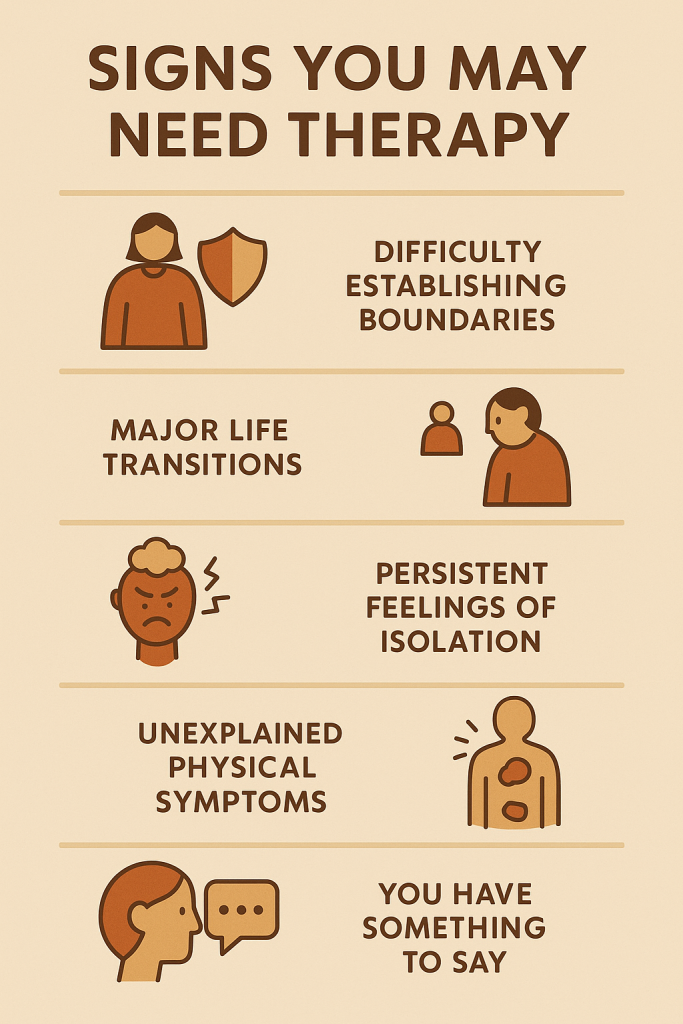How do you know you need therapy?
Reviewed by Dr. A. Iacobucci ✅
This blog helps readers identify when therapy may be needed, outlining emotional, behavioral, and physical signs that signal it might be time to seek help. It explains various therapy types, the benefits of therapy, and emphasizes that seeking support is an act of strength — not weakness — while empowering individuals to embrace healing through self-awareness and professional guidance.
In the intricate tapestry of life, we often encounter moments of joy, triumph, and fulfillment.
Yet, there are also times when the fabric becomes frayed, and the colors lose their vibrancy. In these challenging moments, therapy emerges as a beacon of hope, a transformative journey toward mental and emotional well-being. We will answer pressing questions such as “How do you know if you need counseling?” because recognizing when to seek therapeutic support can be the first step toward healing and self-discovery.
Defining Therapy:
At its core, therapy is a collaborative process between an individual and a trained mental health professional.
It is a safe space where thoughts, emotions, and experiences can be explored and understood. Therapy aims to provide individuals with the tools and insights necessary to navigate life’s challenges, fostering personal growth, resilience, and healing.
The Importance of Mental Health:
Mental health does sometimes take a backseat especially when you are unsure whether you need therapy or not. We are advocates for mental health well-being just as much as we are for our physical health, we tend to prioritize exercise and proper nutrition, but tending to our mental health is equally essential. Many times, the two go hand in hand.
Related: Hydration & Mental Well-Being
Thankfully, the stigma surrounding mental health is gradually fading, opening doors for individuals to acknowledge and address their emotional needs.
This blog serves as a guidepost for those at the crossroads of self-reflection, wondering if therapy is the right path for them.
Let’s see if we can help you recognize the signs that suggest therapy could be beneficial.
Signs you may need therapy
Before anything, you should pat yourself on the back as even the thought of maybe needing therapy shows great introspection and awareness.
Here, we explore five key indicators that could signify therapy could be a valuable resource in navigating the challenges of life.

Persistent feelings of sadness and anxiety
Life’s ebbs and flows can sometimes leave us feeling overwhelmed, but when persistent feelings of sadness or anxiety linger like unwelcome shadows, it may be time to seek guidance. If emotional states become unmanageable and impact your ability to find joy or peace, therapy offers a space to unravel the threads of these complex emotions.
Difficulty coping with daily life
Difficulty coping with the routine challenges of life, such as work, relationships, or personal responsibilities, may indicate that therapeutic intervention could provide valuable coping strategies.
Relationship Issues
Interpersonal connections enrich our lives, but when relationships become strained or fraught with challenges, it can take a toll on our well-being. Whether contemplating “Do we need couples therapy?” or grappling with broader relationship dynamics, seeking professional help can illuminate communication breakdowns and foster healthier connections.
Traumatic Experiences
Life can present us with unforeseen challenges and traumatic experiences that linger in our minds long after the events themselves. If past traumas cast a shadow on your present, therapy offers a supportive environment to process, heal, and cultivate resilience in the face of adversity.
Related: Self-Administered EMDR Therapy At Home
Unhealthy Coping Mechanisms
In the quest to navigate emotional turbulence, individuals may resort to unhealthy coping mechanisms such as substance abuse, self-harm, or avoidance. Recognizing these patterns and understanding that they may be indicative of underlying issues is a crucial step toward breaking free from destructive cycles, and therapy provides a safe space to explore healthier alternatives.
Intense Mood Swings
Extreme fluctuations in mood, from euphoria to deep despair, may signal an emotional imbalance that could benefit from therapeutic exploration. Understanding and managing these mood swings can contribute to a more stable and resilient emotional state.
Persistent Self-Doubt or Low Self-Esteem
Experiencing chronic self-doubt, low self-esteem, or a pervasive sense of inadequacy can hinder personal growth and well-being. Therapy provides a space to challenge and reframe negative self-perceptions, fostering a healthier self-image.
Related: Overcoming Negative Thought Loops
Difficulty Establishing Boundaries
Struggling to set and maintain boundaries in personal or professional relationships can lead to stress and burnout. Therapy can assist in developing assertiveness and communication skills, empowering individuals to establish healthy boundaries.
Major Life Transitions
Significant life changes, such as divorce, job loss, or relocation, can trigger emotional upheaval. Therapy offers a supportive environment to navigate these transitions, providing coping strategies and promoting resilience during periods of change.
Persistent Feelings of Isolation
Feeling consistently isolated or disconnected from others may indicate a need for therapeutic exploration. Therapy can provide a space to examine relational patterns, enhance communication skills, and foster meaningful connections.
Related: Combating the Loneliness Epidemic
Difficulty Managing Anger
Uncontrolled anger or frequent outbursts may be indicative of unresolved emotions or underlying issues. Therapy can help individuals understand the root causes of anger and develop healthier ways to express and manage this powerful emotion.
Unexplained Physical Symptoms
Psychological distress can manifest in physical symptoms such as headaches, stomach aches, or fatigue. If medical conditions are ruled out, therapy can assist in exploring the potential emotional or psychological contributors to these symptoms.
You Have Something To Say
Therapy isn’t solely about addressing problems; sometimes, it’s about sharing thoughts with an unbiased perspective. In moments when confiding in those close to you feels challenging, a therapist is readily available with just a phone call.

Choosing the right type of therapy for you
In the vast terrain of therapy, several approaches stand out for their effectiveness.
Cognitive Behavioral Therapy (CBT) guides individuals in identifying and modifying negative thought patterns, fostering positive behavioral changes.
Psychodynamic Therapy delves into the subconscious, unraveling past experiences to illuminate present behavior.
Mindfulness-Based Therapy integrates meditation and awareness techniques to cultivate present-moment focus and alleviate stress.
While these are just glimpses into the therapeutic spectrum, choosing the most suitable approach often involves a nuanced understanding of individual needs.
To pinpoint the right fit, consider initiating a free consultation here, providing an invaluable opportunity for personalized guidance and informed decision-making on the journey to mental health and well-being.
For more on mindfulness-based therapy, explore the benefits of guided meditation with this exceptional app: Limitless Guided Visualizations. Enhance your well-being journey today.
Benefits of Therapy
Therapy is a transformative journey with many benefits. Through self-exploration, individuals gain improved self-awareness, aligning their actions with authentic values. Equipped with enhanced coping strategies, they navigate life’s challenges with resilience.
Beyond personal growth, therapy extends positive ripples into relationships, fostering healthier dynamics.
Embracing emotional regulation, individuals not only manage stress but also enrich their interactions with others. As a beacon of self-discovery, therapy transcends symptom relief, empowering individuals to lead more authentic, purposeful lives.
Consider a free consultation to embark on this impactful journey toward mental health and well-being.
Breaking Down Stigma
Overcoming barriers to mental health involves dispelling misconceptions about therapy, normalizing help-seeking as a proactive step, and encouraging open conversations.
By addressing myths, shifting the narrative, and fostering a culture of understanding, we collectively work towards a society where seeking therapy is seen as a strength, and conversations about mental health are met with empathy and support.
Conclusion
Seeking support is an act of strength, not weakness. Read that again. Whether recognizing the signs that therapy may be beneficial, understanding the diverse therapeutic approaches available, reaping the benefits of self-discovery, or breaking down the barriers of societal stigma, the path to mental well-being is multifaceted.
By embracing the power of therapy, normalizing help-seeking behavior, and fostering open conversations about mental health, we empower ourselves and others to navigate life’s complexities with resilience and authenticity.
Something to take away
Whether you are yet to see a therapist or have already started there is something to remember, and that is to recognize that the true path to recovery lies within oneself. While acknowledging past traumas and experiences is important, it’s equally vital to remember that these events are not occurring in the present moment.
The essence of healing resides in the power of now — the capacity to embrace the present, learn from past experiences and cultivate inner strength for a more resilient and balanced life.







